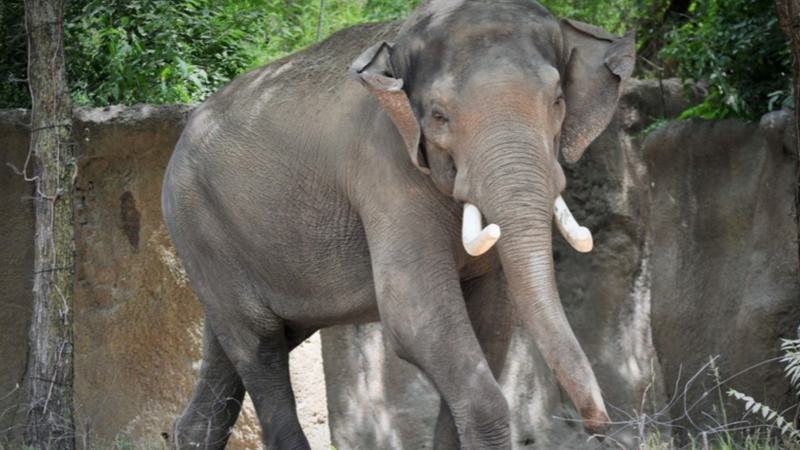Aug. 20 update: The Saint Louis Zoo continues to mourn the loss of Avi, the first male Asian elephant born at the Zoo since his father, Raja, 27 years ago.
Preliminary necropsy (animal autopsy) results showed two significant, irreversible birth abnormalities that explained Avi’s struggles in his early life: one affecting the major vessels connected to his heart, and one affecting his spine.
The Zoo’s veterinary pathologist identified a patent ductus arteriosus (PDA) as a contributing factor to Avi’s inability to thrive over the first 27 days of life, despite intensive supportive care. A PDA is an opening between the two major blood vessels leading from the heart. The opening, called a ductus arteriosus, is a part of fetal development that normally closes around the time of birth, but in Avi’s case, it did not. The abnormal blood flow caused by a ductus arteriosus that remains open (or patent) after birth means that some of the blood does not go to the lungs to get proper oxygen levels.
The cause of a PDA is usually unknown in humans or animals affected by it. PDA is uncommon and difficult to diagnose in large animal species. A PDA and the associated abnormal blood flow can manifest as weakness, lethargy and a decreased feeding response, which Avi experienced.
In addition, Avi had an abnormal spinal conformation that limited his ability to raise his head, and position himself to feed on his own. Although the caretakers provided Avi with supplemental feedings, the severity of these concurrent abnormalities was too much to overcome.
Surgical correction was not an option for an elephant with either of these conditions.
Comforted by the rest of the Zoo’s elephant family, Avi’s mother, Rani, is in good health and is receiving excellent care by the Zoo’s Elephant Care Team of keepers and veterinarians.
The Zoo wishes to express its sincere thanks to everyone for their support and thoughts.
Elephant Calf Born at Saint Louis Zoo on July 6 Has Died
The Saint Louis Zoo is saddened to announce that the male Asian elephant calf born on July 6, 2020, has died. The decision to humanely euthanize the calf was made and he passed away peacefully this morning, August 2, 2020.
The Zoo's Elephant Care Team of keepers and veterinarians worked around the clock to provide the best care for the new calf and his mother, Rani (pronounced "Ronnie"), who was near her calf at every moment. The calf had developmental impairments that limited his ability to feed since birth. Despite intensive care efforts and life support measures, including assistance with feedings and continuous intravenous treatments, the calf did not improve. Over the last 48 hours, the calf's already compromised health deteriorated rapidly.
"Everyone here is just devastated right now," said Jeffrey P. Bonner, Ph.D., Dana Brown President and CEO, Saint Louis Zoo. "Our team of professional elephant care experts did everything possible to help improve the calf's health. Unfortunately, in the end, it just wasn't enough as his health complications were too severe."
While the calf lived a short life of 27 days, he made quite the impression on the Elephant Care Team, which had prepared for his arrival for almost three years. The keepers named him Avi (pronounced AH-vee), which means "the sun and air."
"The animal care team who worked so closely with this calf every day of his short life, and all those who loved him, are understandably grieving," said Luis Padilla, DVM, Vice President of Animal Collections, Saint Louis Zoo. "Avi will be missed, but never forgotten."
"The community followed Rani's journey from pregnancy to birth and provided support and positive thoughts for the calf and the Elephant Care Team when they learned of the calf's developmental and health impairments. The outpouring of support that we have received from the community has been incredible. I know everyone joins us in our sense of loss, and that helps our team get through these difficult times," said Dr. Padilla.
The veterinary team will conduct a full necropsy (animal autopsy). Results of the necropsy will not be available for several weeks.
Elephant background
An elephant pregnancy lasts about 22 months and a newborn weighs about 250-350 pounds. Rani received regular prenatal health checkups by the Zoo's elephant care team throughout her pregnancy.
Avi was Rani's third baby. Jade was born in 2007 and Kenzi, who died in 2018, was born in 2011. The Zoo's bull elephant, 27-year-old Raja, is the father. He was the first Asian elephant ever born at the Zoo in 1992, and this calf was his fifth offspring.
Rani is part of a nine-member, three-generation elephant family that includes Ellie (mother), Maliha, Jade (daughter), Priya, Donna, Sri, Pearl and Raja at the Zoo's River's Edge and Elephant Woods habitats. Rani and Ellie arrived at the Saint Louis Zoo in 2001 from the Jacksonville Zoo, where Rani was born in 1996.
Species Survival Plan
This elephant breeding was recommended by the Association of Zoos and Aquariums Asian Elephant Species Survival Plan, a national cooperative breeding and management program responsible for maintaining a genetically healthy population of Asian elephants in North American zoos.
Asian Elephant Conservation
There are fewer than 35,000 Asian elephants left in the wild, and they are facing extinction due to poaching for ivory and habitat destruction. Given the shrinking population of Asian elephants, the Saint Louis Zoo is committed to conserve this endangered species. The Saint Louis Zoo WildCare Institute Center for Asian Elephant Conservation supports the welfare and conservation of Asian elephants in Sumatra and other countries in Asia through the International Elephant Foundation. The Saint Louis Zoo WildCare Institute Center for Conservation in the Horn of Africa also supports conservation of African elephants in Kenya through the Northern Rangelands Trust.
"Elephants in the wild face a growing number of threats, and elephants in zoos provide a genetic safety net should wild populations continue to decline," said Katie Pilgram-Kloppe, Zoological Manager of River's Edge, Saint Louis Zoo.


